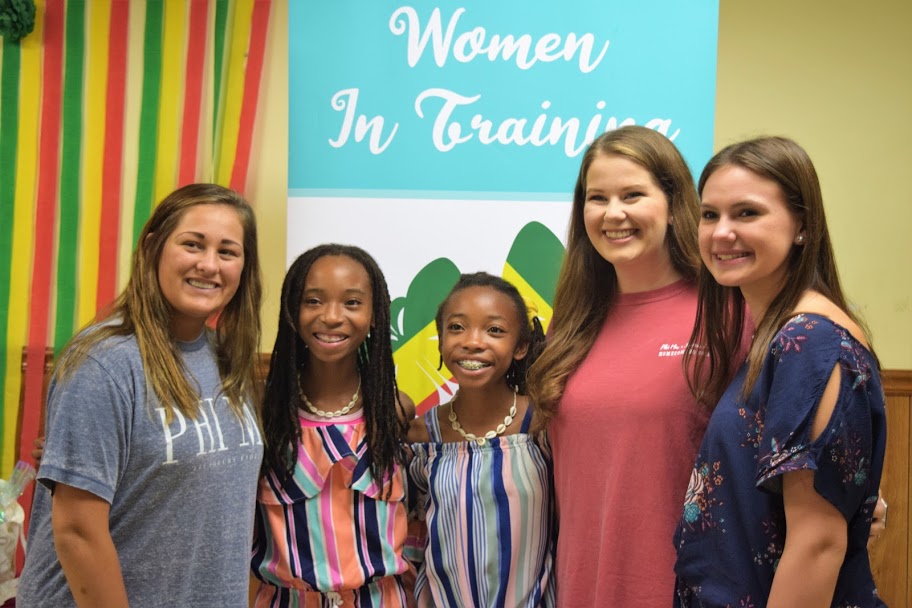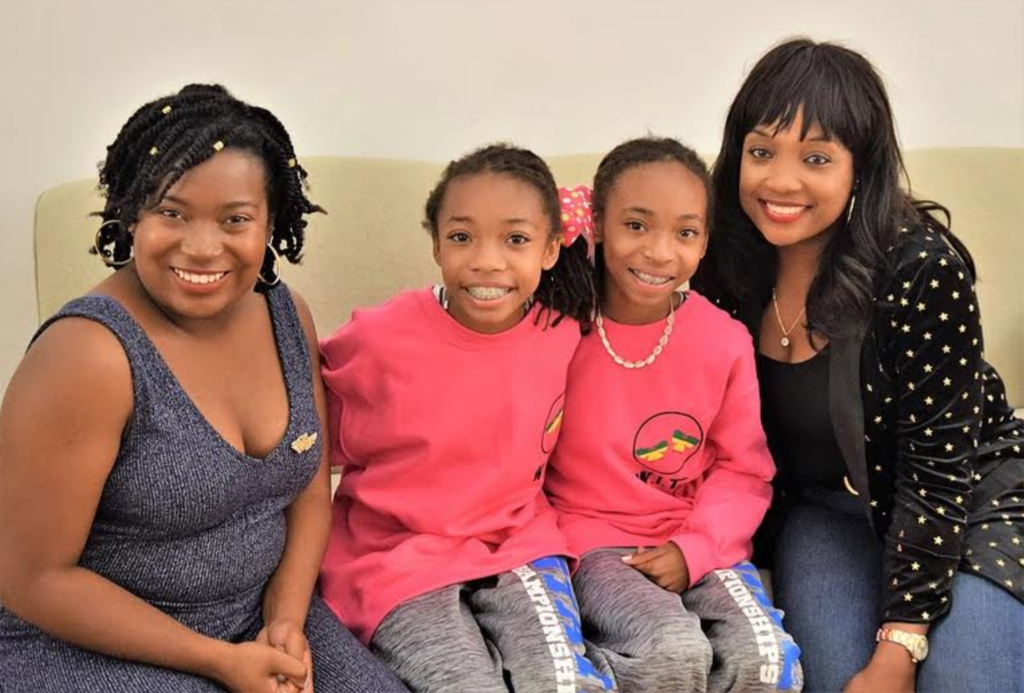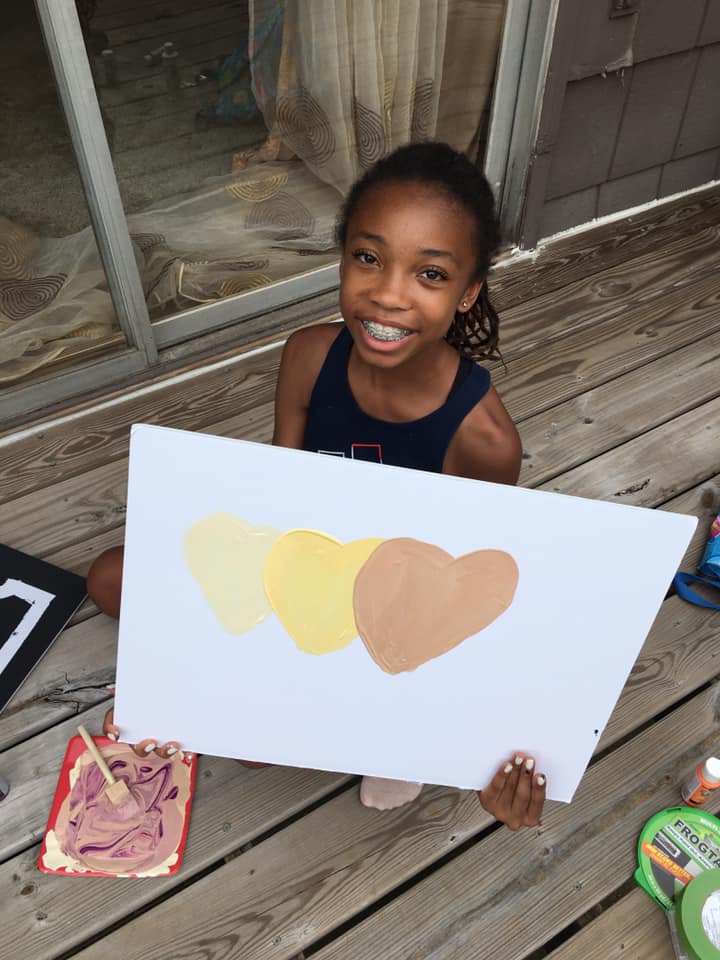So, the question I often ask myself about Breanna, in particular, is this: is she isolated at school, and self-identifies as weird because she is one of the few Black students in a predominantly white school, or because of her gifted characteristics?
“Please stop calling me gifted, Mom! Everyone knows that means I’m stupid and weird and useless!” my dear Breanna cried out in utter frustration.
“No, sweetheart. It means you think differently,” I softly explained for the nth time. This time, I tried, quite unsuccessfully, to hold back the flood of tears gushing from my own soul. It is painful seeing my child so frustrated with her own identity as a gifted human being while also experiencing life through the lens of a Black girl-child.
Breanna is Black and comely, as King Solomon described Makeda, the Ethiopian Queen of Sheba. She is generally confident, knowledgeable, compassionate, and talented. Bree and her twin sister, Brooke, attend one of the two private, college preparatory schools that were established in Montgomery, Alabama, in 1955. Throughout the South, white parents and churches worked together to form private schools, such as the one my daughters attend, to circumvent complying with the Brown v. Board of Education of Topeka Supreme Court ruling that desegregated public schools. While those schools now accept a handful of African American students, are they ever truly accepted there?

Ironically, my daughters’ school recently issued a public statement in support of the Black Lives Matter movement; however, there has never been a Black grade-level or core academic subject teacher or administrator at the school. “Naturally,” the cleaning men and women, cafeteria workers, and security guards are Black.
Both Breanna and Brooke came home enraged a few years ago after an elementary teacher told the class: “Good white people had slaves,” and “Slaves were happy.” From the lens of children of African descent, “good” people do not kidnap, purchase, sell, rape, lynch, and hold other human beings as property. Likewise, our ancestors were not “happy” about being kidnapped from their homelands, transported across the Atlantic Ocean in the belly of a ship, forced to work from sunrise to sunset without compensation, raped, and stripped of their languages, religion, and families. Instead of making public declarations of support for justice, how about properly educating children on the realities of the Enslavement Era? How about employing a few Black classroom teachers?
I digressed; this article is about the gifted characteristic of being considered weird. The thing is, neither of the twins is weird or even awkward. In fact, they’re really graceful. So, the question I often ask myself about Breanna, in particular, is this: is she isolated at school, and self-identifies as weird because she is one of the few Black students in a predominantly white school, or because of her gifted characteristics?
Breanna said she often walks alone to lunch. And sits alone. Brooke usually walks and eats with one or two other girls. Yet Bree insists on remaining at this school. Perhaps the status of being a student at one of the few schools in Alabama that is not dismally failing its students is more important than her social isolation. Her twin sister, Brooke, who has school friends, sorta (friends who have parties, but don’t extend invitations to her) cries every single morning, “I hate that school. Mom, PLEASE don’t make me go there!” Brooke wants to remain on the school’s dance team but take classes virtually. The school does not provide this option. What can I do? The only other private school in Montgomery that is accredited by the National Association of Independent Schools is the other one formed to avoid integration. The public schools in Alabama are ranked the lowest in the nation. I am at a loss for solutions to our need for an academically challenging, emotionally welcoming, and culturally sensitive learning environment for my children.

In all fairness, Breanna is probably not the easiest personality. She is impatient with the slow pace with which others think and work. Classmates who dare ask her to read their paper might get the following feedback (that she often gives her twin sister): your paper is too long, or short. Your vocabulary is below grade level. Your arguments are weak and not well thought-out. Your research is lacking alternative points of view. She has a difficult time meeting deadlines because she never thinks her work is perfect enough to submit, plus she has a pressing desire to solve the world’s ills. She often stays up until the wee hours of the morning stressing about a single sentence in a paper.
As a child, school is your world. It’s a microcosm where you figure out who you are and where you belong. I’ve tried to help Breanna find her community of twice-exceptional gifted children. Bree, in particular, has made this task incredibly challenging because she wants to be with the cool kids. The YouTubers and the TikTokkers. She knows the dances. Knows the song lyrics. Somehow, though, the cool kids seem to know that deep down inside she’s not one of them.
Other Black children call Bree “too white,” so she doesn’t easily find allies there. On top of Breanna and Brooke supposedly being “too white,” a young man kindly told me a few months ago: “Your daughters are really sweet and pretty, and they do great work in the community.” He started out diplomatically. “But—they’ll never be accepted into Jack and Jill or any other Black organizations because y’all are not from here, plus you’re only an educator, and your husband is only a writer. When y’all up y’alls social standing, then your daughters can also move up.”
Oh, lawd! Now, I know the secret to my gifted Black girls finding community!
There are a few places where Breanna is somewhat accepted. On the track field, for one. The track-and-field coach actively recruited her to run Cross Country and worked with her daily to stay focused. Running actually serves a dual role. Bree has an eye-teaming disorder, and her vision therapist advised her to run regularly to help clear her head from the pressure of constantly tracking her eyes to focus while reading or even watching videos. That coach has retired, but I believe the new coach will be as diligent. Even though she is part of the school’s team, Cross Country is a solitary sport. You’re out on the open field, surrounded by other runners, but solely responsible for beating your own speed each time.

The Chorus teacher also encouraged Bree to remain in her class for the third year of middle school, but Breanna wants to try something new: digital journalism. She has an insatiable desire for exploring new subjects and experiences. Sadly, the school rejected her request to take digital journalism. She also applied to be on the IT Team to help other students with technical issues. Of course, her request was rejected; however, she has been admitted into the Invention Convention course!
Bree has also joined the school’s dance team. Let’s see if any friendship develops there. Bree gravitates to girls and boys who are a few years older than her, and the team has dancers from eighth to twelfth grade. There’s hope.
In and outside of school, Bree has found short-term communities in theatre. She has performed in musical theatre and dramas in community theatre, at the Alabama Shakespeare Festival, and in school performances. The performers work closely and intensely together for a few months, but once those performances end, the tight knit “community” disintegrates.
Often, Black families find community at church. We are members at Dexter Avenue King Memorial Baptist Church and receive lots of hugs and kisses there. As is common in many traditional churches, the average congregant is around age seventy-five, so there isn’t much room for camaraderie there!
I have some piece of mind, though, that Breanna and Brooke will soon work out their desire to have friends who understand them. My two older “weird” Black daughters—Nuola Akinde, now thirty-one, and Moremi Akinde, now twenty-seven, have beautifully formed their own communities. I’m confident that the younger girls will also figure out their place in the world. They formed the Women in Training (WIT) youth empowerment organization to work for social change, specifically focusing on creating menstrual equity. Perhaps they will create their own community through WIT!
An absolutely important, engaging, informative and well written article on a critical parent topic! Thank you Adeyela!
Thank you, Doc, for valuing my meager contribution to the gifted dialogue🙏
Far from meager! I would strongly encourage both you and your daughters to read Stephanie Tolan’s books–most particularly “Welcome to The Ark.” The world is always trying to knock down the gifted–especially some teachers, administrators, and school systems. They have to make everyone equal, doncha know, and the only way to make gifted children equal is to cut off their heads. Read Kurt Vonnegut’s “Harrison Bergeron.”
I’ve been fighting this battle my whole life. My mother fought this battle. Her father fought this battle. I can only imagine how much worse it would be were I Black in the South. Obviously, you’ve managed beautifully with your older daughters. Keep up the good work!
Thank you so much for your confirmation. You know how we tend to second-guess ourselves!
Pegi, I love that you mentioned Harrison Bergeron! That was one of my favorite books in high school—it resonated so much then, I just didn’t know why yet! I had my ten-year-old son read it this year, and he also loved it.
And I heartily agree with you on the “far from meager”! 🙂
I can relate to your story very much. My son is a gifted student. And being almost the only Asia in a predominantly white school it is very hard to build solid friendship with other kids. This is kind of the disadvantage of being minority. I feel the same pain as you feel. And I just hope our kids can grow up strong no matter what kind of challenge they have to endure during the process!
I welcome you to write about your son’s experience. I believe most Americans think Asian children WANT to be alone. Very few people want to be alone; we are social beings.
This article is everything. Thank you for being transparent about the struggles faced.
It was very difficult to write about these experiences, so I truly appreciate your kind words:)
Great insightful and transparent article! I’m so glad the young ladies are plowing through with grace.
They are! It’s a daily struggle.